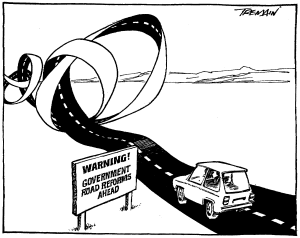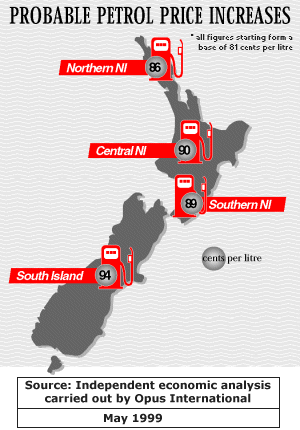Petrol Price Increase Likely
South Islanders Hit Hardest
If the Government’s reform of the management and funding of New Zealand’s roads goes ahead, petrol prices would increase. If spread evenly across the whole country, the petrol price rises brought about by the Government proposals would be just seven cents per litre. However, because the plan seeks to establish regional companies to run the roads, South Islanders will be hardest hit. While price rises in some North Island centres would be around just five cents, South Islanders can expect a hike of at least 13 cents a litre - taking the pumpprice of Unleaded 91 grade petrol from 81 cents to 94 cents per litre. Christchurch people who currently spend $20 a week on petrol would pay at least $23 under the reforms. Meanwhile, rates would fall as the service provided by the City Council to maintain and develop Christchurch roads is transferred to a commercial, profit- driven company, funded by petrol taxes instead of rates. In fact, if the company is required to pay tax and decides to make a profit, the petrol price increase would be more than 13 cents per litre, and could be as high as 20 cents.
|
| To work out how this would change your rates and petrol bills, see inside |

|

|
|
|
This Issue Affects Everyone

When you commercialise assets
developed by the community, it is the
community which ends up paying.

|
In December last year the Government announced a series of proposals to reform the way our roads are managed and funded. Since the end of April the Government has been considering responses to the proposals. More decisions are expected over the coming months, but possibly not before this year’s general election. These reforms would have a negative impact on our communities because:
- Roads are community assets which have been built up over generations — they should not be used to generate a profit.
- Many people, particularly in the South Island, would end up paying more for roads through higher petrol prices — despite these increases being partially offset by a reduction in rates, this would have an adverse impact on many communities, including Christchurch.
- Local communities would no longer have effective control of their own roads.
The most important parts of these proposals are to:
- Establish between four and eight commercial companies which would be responsible for managing, building and maintaining local roads throughout New Zealand.
- Transfer control of local roads from councils to these commercial companies
- Turn Transit NZ, the body which builds and maintains State Highways, into a state- owned enterprise.
- Make every road user pay these new commercial companies for the actual costs of their use of the roads, with the prices set by the companies themselves, according to a regulatory regime established by the Government.
Even though you may not have heard much about these proposals, roading reform is an issue which will affect everyone. The Minister of Transport, Maurice Williamson, has said that this is the most important reform that New Zealand has undertaken in the last 50 years — more important than health, more important than electricity, or ports, or agriculture. I think he is right about this — that’s why we must get the reforms right.
|
Along with many other local authorities throughout New Zealand, Christchurch City Council agrees that there should be some change to improve the way our roads are funded and managed. However, we do not believe that the Government has found the right solution. In fact, we think these proposals would make the situation a whole lot worse. The parallels between the electricity reforms and the Government’s plans for roads are too great to ignore. The electricity reforms have shown how vital it is to maintain local control of local community assets. Power supply is an important asset. Roads are even more important. They must remain in direct community control. The Government has reformed the electricity sector in an attempt to introduce competition. We have now seen the result of that - price rises. When you commercialise assets developed by the community, it is the community which ends up paying. The Government apparently wants to repeat with roads the ‘experiment’ it has already carried out on electricity. Turning roads over to commercially motivated companies would have an even more dramatic impact. Imposing a commercial model on electricity was one thing - and we have now seen the consequences it has brought to ordinary New Zealanders. The situation with roads will be even more serious because they are a natural monopoly. The Minister of Transport’s plans for our roads are to commercialise that monopoly. What this will mean in practice to ordinary motorists is that petrol prices will rise. What it will mean to communities is that they will no longer have effective control of the management of the roads that we use every day. Along with other councils, Christchurch City Council has developed some principles and an alternative model which we believe are a lot better than the Government’s reforms. We want to see some changes too and we have been working with the Mayors of all the other councils in the region to agree what those changes should be. This four page supplement has been produced to explain the roading reform issue and outline the principles we think should be applied to find a solution which suits everyone — and ensures that the disasters of the electricity reforms are not repeated with even greater effect.

Garry Moore
Christchurch Mayor
|



![]()
![]()
